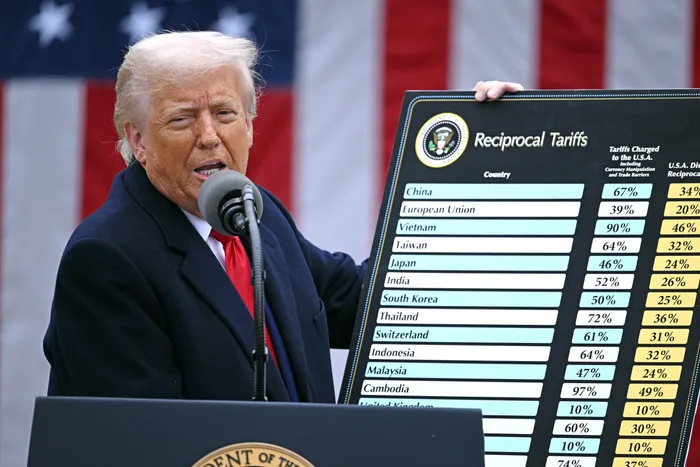Trump tariffs upon us and the Sarb tightens our belts

President Donald Trump holds a chart on reciprocal tariffs during an event titled ‘Make America Wealthy Again’, at the White House in Washington, DC.
Image: Brendan Smialowski/AFP
The South African Government has “pulled out all the stops” during a flurry of trade delegations and counter offers but is now making arrangements to deal with the expected fallout, including the establishment of an export-support desk that will provide updates and advisory services to exporters, and a rumoured package of Treasury-backed incentives for some affected sectors.
Trump tariffs prompt Africa’s recalibration
These matters are, as always, subject to change.
In April the Trump administration announced a 31% tariff on South Africa, which was then suddenly dropped to 10%.
Lesotho, somehow, evaded its scheduled 50% tariffs this week, which would have halved its economic growth this year and again the next. Lesotho now faces 15% tariffs, but the damage done by the US here and elsewhere won’t immediately be forgotten.
In Maseru layoffs have already occurred, and textile manufacturers are energetically looking for new markets.
Meanwhile, China announced plans to eliminate all tariffs on imports from 53 African states, expressly positioning itself as Africa’s preferred trading partner. The global order is being firmly shaken. Who will be best placed to pick up the pieces?
Will the Sarb’s new inflation anchor drag against growth?
After the 31 July SARB Monetary Policy Committee meeting, the Reserve Bank Governor Lesetja Kganyago announced a 25-basis point lowering of the interest rate and that the SARB would be revising its inflation target to 3% from its previous 3–6% range.
The revised target makes it unlikely that we’ll see any more interest-rate cuts this year, meaning borrowing will remain more expensive than many households and businesses might have hoped.
Kganyago emphasised that the SARB expected the new target to enhance credibility with global investors – making borrowing for the state less expensive – and protect the rand (which has fallen to a several-month low nonetheless).
StatsSA will release its CPI inflation data around 20 August, which will give SMEs some guidance in terms of input-cost planning in this tightening market.
Upcoming indicators will show the effect of uncertainty on business conditions
Economic indicators scheduled for release in August will provide useful guidance for SME planning.
The S&P Global South Africa PMI announced on 5 August 2025 serves as a single-figure snapshot of operating conditions in the private-sector economy.
Recent PMI performance showed improvement to 50.8 in May 2025, marking the first growth since November 2024, and indicating the fastest business activity expansion in four years.
The Bureau for Economic Research conducts its quarterly business confidence survey mid-August, with questionnaires distributed to manufacturing, retail, wholesale, and construction sectors.
Results, typically published in early September, will influence Q4 2025 business planning. Current confidence levels fell to 40 points in Q2 2025 from 45 points in Q1, remaining below the long-term average of 43 points, suggesting cautious SME sentiment, and who’s to blame them.
Global government representatives arrive in SA to discuss the plight of the SME
Deputy President Paul Mashatile delivered the closing remarks at the Global SME Ministerial Meeting on 24 July 2025 in Boksburg.
The event, themed “Navigating New Business Frontiers”, brought together representatives and Ministers from more than 100 countries to “address the most pressing issues hindering SMEs from reaching their full potential.”
Deputy President Mashatile emphasised the importance of the African Continental Free Trade Area Agreement to the continent’s entrepreneurial landscape, and of the SME sector in general, but could reference nothing concrete the government was doing to support them, apart from the R100 Billion Transformation Fund touted by Trade, Industry and Competition Minister Parks Tau, with public comment currently being reviewed by the dtic.
GNU passes a national budget
In some good news, the GNU continues to make its way unsteadily forward, with the National Council of Provinces effectively passing the 2025 National Budget.
All GNU partners approved the Appropriation Bill that allowed the budget process to be concluded. When tough conditions prompt pragmatic alignment amongst our political leaders, at least there’s some room for optimism.
Miguel da Silva, Group Executive: Business Banking at TymeBank.

Miguel Da Silva.
Image: supplied.
BUSINESS REPORT